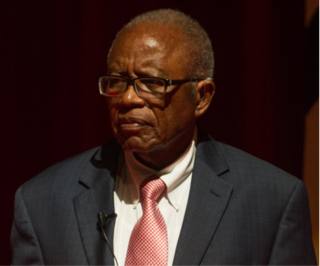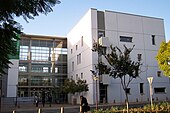
Human rights are moral principles or norms for certain standards of human behaviour and are regularly protected in municipal and international law. They are commonly understood as inalienable, fundamental rights "to which a person is inherently entitled simply because she or he is a human being" and which are "inherent in all human beings", regardless of their age, ethnic origin, location, language, religion, ethnicity, or any other status. They are applicable everywhere and at every time in the sense of being universal, and they are egalitarian in the sense of being the same for everyone. They are regarded as requiring empathy and the rule of law and imposing an obligation on persons to respect the human rights of others, and it is generally considered that they should not be taken away except as a result of due process based on specific circumstances.

The European Court of Human Rights, also known as the Strasbourg Court, is an international court of the Council of Europe which interprets the European Convention on Human Rights. The court hears applications alleging that a contracting state has breached one or more of the human rights enumerated in the convention or its optional protocols to which a member state is a party. The court is based in Strasbourg, France.

Human Rights Watch (HRW) is an international non-governmental organization headquartered in New York City that conducts research and advocacy on human rights. The group pressures governments, policymakers, companies, and individual human rights abusers to denounce abuse and respect human rights, and often works on behalf of refugees, children, migrants, and political prisoners.
Personality rights, sometimes referred to as the right of publicity, are rights for an individual to control the commercial use of their identity, such as name, image, likeness, or other unequivocal identifiers. They are generally considered as property rights, rather than personal rights, and so the validity of personality rights of publicity may survive the death of the individual to varying degrees, depending on the jurisdiction.
Landmark court decisions, in present-day common law legal systems, establish precedents that determine a significant new legal principle or concept, or otherwise substantially affect the interpretation of existing law. "Leading case" is commonly used in the United Kingdom and other Commonwealth jurisdictions instead of "landmark case", as used in the United States.

The African Commission on Human and Peoples' Rights (ACHPR) is a quasi-judicial body tasked with promoting and protecting human rights and collective (peoples') rights throughout the African continent as well as interpreting the African Charter on Human and Peoples' Rights and considering individual complaints of violations of the Charter. This includes investigating human rights violations, creating and approving programs of action towards encouraging human rights, and set up effect communication between them and states to get first hand information on violations of human rights. Although the ACHPR is under a regional government facility, they don't have any actual power and enforcement over laws. This ends up in them drafting up proposals to send up the chain of command to the Assembly of Heads of State and Government and they will act accordingly.

The African Court on Human and Peoples' Rights, also known simply as the African Court, is an international court established by member states of the African Union (AU) to implement provisions of the African Charter on Human and Peoples' Rights. Seated in Arusha, Tanzania, it is the judicial arm of the AU and one of three regional human rights courts.
A dissenting opinion is an opinion in a legal case in certain legal systems written by one or more judges expressing disagreement with the majority opinion of the court which gives rise to its judgment.

Fred David Gray is an American civil rights attorney, preacher, activist, and state legislator from Alabama. He handled many prominent civil rights cases, such as Browder v. Gayle, and was elected to the Alabama House of Representatives in 1970, along with Thomas Reed, both from Tuskegee. They were the first black state legislators in Alabama in the 20th century. He served as the president of the National Bar Association in 1985, and in 2001 was elected as the first African-American President of the Alabama State Bar.
Derogation is a legal term of art, which allows for part or all of a provision in a legal measure to be applied differently, or not at all, in certain cases. The term is also used in Catholic canon law, and in this context differs from dispensation in that it applies to the law, whereas dispensation applies to specific people affected by the law.

The right to housing is the economic, social and cultural rightto adequate housing and shelter. It is recognized in some national constitutions and in the Universal Declaration of Human Rights and International Covenant on Economic, Social and Cultural Rights. The right to housing is regarded as a freestanding right in the International human rights law which was clearly in the 1991 General Comment on Adequate Housing by the UN Committee on Economic, Social and Cultural Rights. The aspect of the right to housing under ICESCR include: availability of services, infrastructure, material and facilities; legal security of tenure; habitability; accessibility; affordability; location and cultural adequacy.
The African Human Rights Law Journal publishes peer-reviewed contributions dealing with human rights related topics of relevance to Africa, Africans, and scholars of Africa. The journal appears twice a year, in March and October.

The Centre for Human Rights at the University of Pretoria Faculty of Law, South Africa, is an organisation dedicated to promoting human rights on the continent of Africa. The centre, founded in 1986, promotes human rights through educational outreach, including multinational conferences, seminars and publications such as Human Rights Law in Africa, The African Human Rights Law Journal, the African Human Rights Law Reports and The Constitutional Law of South Africa. The centre, which was founded during Apartheid, assisted in adapting a Bill of Rights for South Africa and contributed to creating the South African Constitution. In 2006, the centre received the UNESCO Prize for Human Rights Education, particular recognising for the LLM in Human Rights and Democratisation in Africa and the African Human Rights Moot Court Competition.

The Supreme Court of Zimbabwe is the highest court of order and the final court of appeal in Zimbabwe.
Iain Tyrrell Benson is a legal philosopher and practising legal consultant. The main focus of his work in relation to law and society has been to examine some of the various meanings that underlie terms of common but confused usage. His work towards an understanding of secular and secularism has been cited by the Supreme Court of Canada and the Constitutional Court of South Africa. He has also given critical study to the terms pluralism, faith, believer, unbeliever, liberalism and accommodation and examined the implications for various legal and non-legal usages.

Shirin Sharmin Chaudhury is a Bangladeshi politician who has served as the first female Speaker of the Jatiya Sangsad since April 2013. At 46 years of age, she became the youngest to assume the office. She was also the Chairperson of the Executive Committee of the Commonwealth Parliamentary Association between 2014 and 2017. She previously served as the state minister of the Ministry of Women and Children Affairs of Bangladesh.
The right to family life is the right of all individuals to have their established family life respected, and to have and maintain family relationships. This right is recognised in a variety of international human rights instruments, including Article 16 of the Universal Declaration of Human Rights, Article 23 of the International Covenant on Civil and Political Rights, and Article 8 of the European Convention on Human Rights.

Intersex people in Kenya face significant human rights violations, starting from birth. There are few protections from mutilation and non-consensual cosmetic medical interventions and no legislative protection from discrimination. Intersex persons may have difficulties in obtaining birth certificates and others forms of documentation.
Lillian Tibatemwa-Ekirikubinza is a Ugandan lawyer, academic and judge, who has served as a Justice of the Supreme Court of Uganda, since 2015.
Capital punishment has been abolished in Sierra Leone. Sierra Leone abolished capital punishment in July 2021 following a decision by the nation's Parliament.










